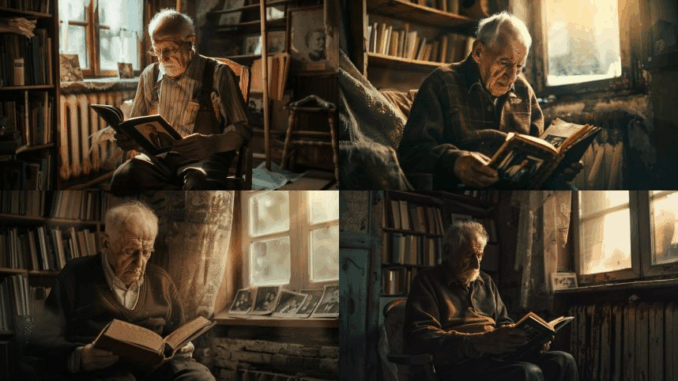

The old house stood on a hill, overlooking a valley that was perpetually shrouded in a thin, melancholic mist.
Its windows, like vacant eyes, stared out at the world, reflecting only the gray, indifferent sky. Inside, Elias lived, a man whose every breath seemed to carry the weight of decades of silence.
He was a weaver of shadows, not by trade, but by circumstance, for his days were spun from the threads of what could have been, what should have been, and what was irrevocably lost.
His hands, gnarled and trembling, often hovered over a dusty, ornate photo album on the polished mahogany table in the living room. Each photograph was a splinter in his heart, a vivid, cruel reminder of a life that had fractured into countless pieces.
The album primarily belonged to her – Lena. His Lena. Her smile, captured in fading sepia, was a sun that had set too soon, leaving him in perpetual twilight.
They had been childhood sweethearts, their lives intertwined from the moment Elias, a shy boy with perpetually scuffed knees, had first seen Lena, a girl with laughter like wind chimes and hair the color of warm honey.
Their love story was the kind told in old ballads, a slow, gentle blossoming from shared secrets under ancient oak trees to promises whispered beneath a canopy of stars. They married young, full of the kind of boundless optimism that only youth can afford. Their tiny cottage, nestled at the foot of the very hill where Elias now resided, echoed with their dreams.
Their greatest dream, their most fervent prayer, was for a child. Years passed, marked by hope turning to despair, by whispered fears and silent tears. Lena’s spirit, once so vibrant, began to dim, clouded by the shadow of unfulfilled motherhood.
Elias watched, helpless, as the light slowly receded from her eyes. He tried to reassure her, to tell her that their love was enough, that their life, as it was, was perfect. But the words, heavy with his own unspoken longing, often caught in his throat.
Then came the miracle. Late, unexpected, and fragile. Lena was pregnant. The house, once so quiet, suddenly hummed with a joyful anticipation.
Elias meticulously prepared a nursery, painting little stars on the ceiling, assembling a tiny crib with hands that trembled not from age, but from overwhelming joy.
Lena bloomed, her laughter returning, her eyes once again holding the brilliance of a thousand suns. They talked for hours about names, about the future, about the tiny life growing within her. They had decided on a name: Elara, after Lena’s grandmother.
The day Elara was born was the brightest day Elias had ever known. But it was also the last. Lena, weakened by a difficult labor, never fully recovered.
She held their daughter for a brief, precious moment, her face alight with a fragile, ethereal joy, before slipping away, her last breath a whisper of Elara’s name.
Elias was left with a newborn, a searing grief, and a chasm of unsaid words. He had never fully told Lena how deeply he adored her, how she was the anchor of his world, how even without children, she was more than enough. Now, those words were trapped, echoing in the hollow chambers of his heart.
He tried to be both father and mother to Elara, pouring all his shattered love into her. But grief, like a persistent shadow, clung to him. He became withdrawn, quiet, his conversations with his daughter often stilted, burdened by the unspoken sorrow that permeated their home.
Elara, a bright, sensitive child, grew up in the quiet hum of his melancholy. She learned early to read the unspoken, to navigate the silent currents of her father’s pain. She understood, in her own way, that her existence was intertwined with her mother’s departure, a heavy truth for a young soul.
As Elara grew, she started asking questions about her mother. Elias would show her the photographs, his voice low and choked, sharing fragmented memories. But he could never bring himself to speak of the agonizing love, the desperate longing for Lena to have seen Elara grow, to have experienced the simple joys of motherhood. The words, still unsaid, became a thick, suffocating wall between him and his daughter.
Elara, yearning for the full story, for a connection to the vibrant woman in the photographs, misinterpreted his silence. She saw it as a perpetual mourning for a lost love that overshadowed his love for her, a reminder of what she wasn’t. She began to pull away, seeking warmth and laughter outside the somber walls of their home. Her visits became less frequent, her calls shorter, until the once-a-week ritual dwindled to a once-a-month hurried conversation, and then, eventually, to silence.
Now, only the mist-shrouded valley and the echoing silence of the house remained. Elias, an old man, sat by the window, the ornate photo album open to Lena’s smiling face. He reached out, his trembling finger tracing her image, the same finger that had once meticulously painted stars on a nursery ceiling.
The unsaid words, a lifetime of them, were a heavy shroud, pressing down on him, suffocating him with the bitter knowledge that he had loved Lena so fiercely, but had failed to convey that love fully, and in his grief, had unintentionally pushed away the very last piece of her.
The final, most painful realization was that in his inability to speak of his sorrow, he had condemned himself to a profound and utter loneliness, a silence far deeper than any he had known before.
Để lại một phản hồi